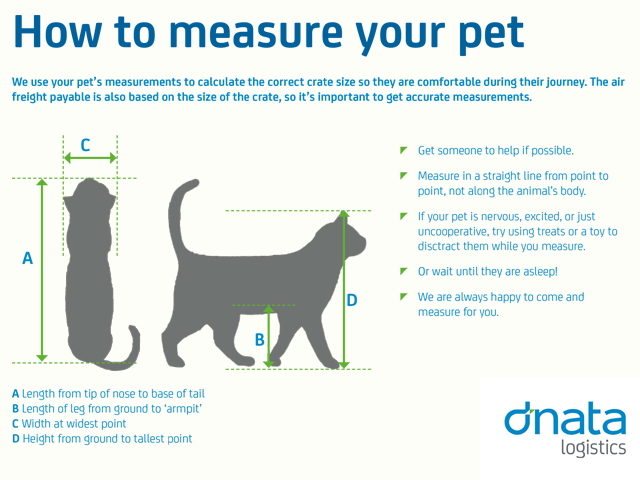- Yes. For exports from the UAE, we take care of everything including the import services at the destination. Please complete the enquiry form and we will get back to you with an estimate.
- For imports to the UAE we will do customs clearance, documentation, inspection and delivery. We can also act on your behalf with the agents handling the export at the origin, if for example if you have already left the country. Please complete the enquiry form and we will get back to you with an estimate.
- Yes. We are partnered with some of Dubai’s most well-regarded veterinary clinics, who provide on-call assistance 24/7 if required.
- We don’t have on-site boarding but we work in partnership with local boarding kennels here in the UAE and overseas. We only work with facilities we would be happy to use for our own pets.
- Yes. We keep a stock of IATA-standard plastic travel boxes. Our in-house master carpenter can also build a made-to-measure wooden crate.
- This depends on the species, airline and destination. Even on flights where pets are allowed in the cabin, they must weigh 8kg or less including the container, and fit under the seat in front of you, so it’s only an option for tiny dogs and small cats. Most airlines don’t accept animals other than cats and dogs in the cabin. Please talk to us on animals@dnatalogistics.com for the latest airline and destination rules.
- Yes, if destination and airline rules allow. Please get in touch on animals@dnatalogistics.com and we will explain the differences between sending your pet as cargo and accompanied baggage.
- Once our trained transport team have handed your pet over at the export dock, he will be taken by ground staff to an air-conditioned staging area where he will be monitored and his water topped up if necessary. About an hour before the flight, he will be taken in an air-conditioned vehicle to the aircraft side. Live animals are usually one of the last items to be loaded. They are often loaded in the rear hold, close to the aircraft tail, along with crew bags and baby strollers. Very large or multiple boxes are loaded on pallets. The shipment is lifted into the hold where the loading team will safely place it on wooden spreaders and tie it down.
- The Pilot in Command will sign a NOTOC (notification to captain) that tells her about all the special cargo on board (so not just live animals, but also dangerous goods or perishables). and what temperature range to set in the hold.
- Your pet will travel with a fixed water container that will be topped up at each touchpoint, including just before loading on the aircraft. Our crates are fitted with a hose and funnel for topping up the water without spilling. For cats and dogs, no food is allowed in the crates, but we can attach a small bag of their favourite dry food to the outside, in case of delays. This is advisable for pets on a prescribed veterinary diet. Unlike cats and dogs, herbivores such as rabbits must be able to eat during the flight, so must travel with food in the box.
- Yes, if the airline and destination rules say it’s allowed. If your pet is a parrot, reptile or other ‘exotic’, it might be listed under the Convention on the Trade in Endangered Species (CITES). If so, additional paperwork and administration will be required. If you would like to know more about transporting your unusual or exotic animal, please get in touch with us on animals@dnatalogistics.com.
- Register your pet’s microchip for free at www.microchipped.ae.


- You should remove your pet’s collar before travel. A collar or harness and lead can be attached to the outside of the crate, but don’t send your favourite, as due to the nature of airline handling, they sometimes get detached. For security reasons, padded beds aren’t allowed, but you can include something that smells like home – a blanket, towel, worn t-shirt or even one of your pillowcases. We provide comfort bedding and a pee-pad as part of the service. For safety reasons, nothing loose such as toys, bowls or brushes can go in the box.
- NO! Please don’t sedate your pet. Sedation is actually against the rules, so airlines won’t accept pets they suspect have been sedated. That’s because:
Click the headings below for more information:
- Sedation can affect your pet’s balance, so she could fall in the box and get injured during loading, offloading or turbulence.
- It affects her body’s ability to regulate her temperature.
- It can affect respiration – this is especially important for snub nosed breeds like Persians and pugs.
- Talk to your vet about alternatives to sedation, such as Pet Remedy or Feliway.
- Some airlines, including Emirates, have a total ban on snub-nosed (brachycephalic) pets. Some allow them to travel only if the temperature at the origin and destination is under a certain level, usually 27°C. If you have a snub-nosed pet, please get in touch on animals@dnatalogistics.com and we can look at the options available to you.
- Live animals are usually one of the first items of cargo to be offloaded. Your pet will be taken to either a holding area, animal reception centre (ARC) or pet hotel in a temperature-controlled vehicle. ARCs and pet hotels have secure kennels so your pet can come out of her box and use the litter tray or have a leg-stretch. While your pet is at the animal reception centre, the import agent will do the customs clearance and any other import procedures. Please note, facilities vary widely for live animals at different airports, so this is not a definitive guide!
- It will be relatively quiet, heated to 15--25°C, and dimly lit. IATA rules state that predators and prey, for example cats and birds, must not be loaded in the same hold. Live animals must not be loaded with certain other types of cargo such as dry ice.
- No. The hold is not accessible during the flight.
- This depends on the destination and the species. For example, Australia requires 10 days’ quarantine for cats and dogs; and rabbits arriving in the UK will have to go into quarantine for four months. Some countries allow home quarantine. Please talk to us on animals@dnatalogistics.com for the most up to date information.
- For imports to the UAE, quarantine isn’t necessary as long as your pet meets all the requirements. Get in touch on animals@dnatalogistics.com and we will talk you through the import process.
- This might be possible with the required supporting documents. Please get in touch on animals@dnatalogistics.com to talk about the available options.
